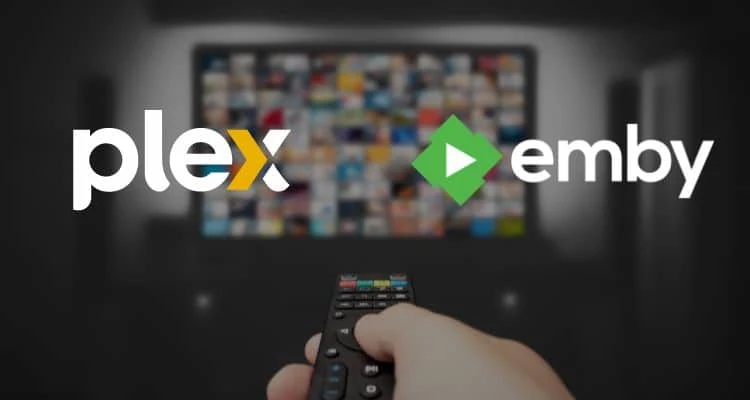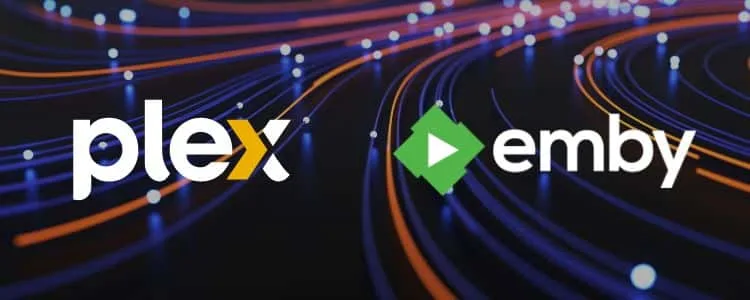Emby vs Plex – Which is the Better Media Streaming Server?

Do you need a media server? Which one is the best media server for you? Which one should you use between Emby vs Plex?
Cord-cutting can be a big change for people who are comfortable using older technology, like cable television. So, in order to make the transition to streaming shows and movies online a positive one, the experience has to offer some benefit and ease of use over older technology.
Emby is a media server that allows consumers to stream media content from their local machines and networks.
Plex is a media server that allows you to provide your own content as opposed to relying on the library of a streaming service.
As a premier provider of media server solutions, ServerMania boasts over 20 years of unparalleled hosting expertise specializing in IPTV and online content distribution systems, making us a trusted partner of choice for businesses seeking reliable and scalable infrastructure solutions.
Here, we have created a comprehensive guide to help you choose between Plex and Emby servers. This guide will explore most of the features that each media server has to offer and which of them will best meet your remote streaming needs.
An online media library can help you organize photos, audio, and videos from your collections and from different online services so that they can be conveniently streamed to other users on your network. Most media servers can be used on multiple devices, including on mobile devices, streaming boxes, web apps, and smart TVs.
Ready to explore more? This article is the ultimate Emby vs Plex guide.
Why Use a Media Server?
Before we dive into reviewing the uses of Emby vs. Plex, here are some of the advantages of using a media server generally speaking, whether through your personal computer or with streaming server hosting.

Complete control over your content
Media servers provide you with complete control over your TV shows and movies. Instead of spending time browsing through videos you have zero interest in, media servers will only display what you have added to your collection.
Alternatively, you can also browse live tv content at your leisure.
Share your content easily
It is very easy to share content to all or some of your network devices when using a home media server. You can control restricted content and monitor usage by all devices. Want to watch a movie that is only available in Europe or Canada? No problem, regional restrictions do not exist.
Save money
It’s always great to save money and still enjoy value. Media servers are cheaper when compared to streaming subscriptions. Keeping up with your favourite shows requires you to pay premium fees to streaming services like Netflix, whereas there are many free features that come with media servers like Emby and Plex. Paying gives you access to many more services.
Access your media offline
With a home media server, you can also take advantage of offline downloading which allows you to store your favourite media to any device. This allows for easy viewing later, even without an internet connection.
Emby vs Plex: Which Media Server Should You Choose?
Now that you have an idea of how you stand to benefit from using a media server, let’s talk about Emby vs. Plex.

What is Emby Media Server?
Emby is a media server that allows consumers to stream media content from their local machines and networks. The general idea is that the main server stores all media files, then the Emby server software serves it to you when you look for the data. Emby has an app called the Emby client software that, once installed on your mobile device, computer, or set-top box, works like a streaming application, like Android TV.
What is Plex Media Server?
Plex is a media server that allows you to provide your own content as opposed to relying on the library of a streaming service. This content is not static, meaning you’ll always have variety. Plex allows you to organise your shows and also provides lyrics to your music. Generally, it is meant to add more order to your life.
Installing Plex and Emby
Both Plex and Emby media servers are set up similarly and are not complicated to configure, in particular when paired with a cloud server hosting solution. The first step is to download the installation files from the respective sites. You should then launch the installer and give the server a few minutes to install. The server software should be installed on the device that contains your media.
A local website is then created and you’re redirected there after the installation has been completed. The site allows you to customise some of the settings including the folders that you want to have available on the media server. Emby and Plex then synchronise the different media from the folders you selected.
Both media servers are installed in the same way, with the main distinction being that Emby allows for more customised settings.
The huge number of settings is ideal for those with technical know-how, most of which are not compulsory. Your server will run based on the default settings.
In terms of installation, Plex is ideal for beginners while Emby requires some technical knowledge. Read our comprehensive guide on how to set up and use a Plex media server for movies and TV.
Compatibility With Other Devices
Both Emby and Plex support numerous devices so you are most likely sorted regardless of the device you would like to use. Both media server software platforms may be installed on most major desktop operating systems and mobile devices.
There are also some hardware requirements for running a Plex media server. You may also use any of the apps or devices listed below:
Android TV, Apple TV, iOS, Android, Amazon Fire TV, Amazon Alexa, Android Auto, Samsung Smart TV, MacOS, Linux, Kodi, NVIDIA Shield, Raspberry Pi, PS 3, PS 4, Roku, Windows Media Center, XBOX 360, XBOX One, Windows Store, Windows Desktop, and Web App.
As you can see, it is an extensive list that comprises most devices that you use regularly. Don’t see your favourite app or device on the list? Check out the Plex and Emby websites for further guidance. Emby and Plex server hosting have also been designed to interact with many smart home devices to give you the best experience.
Both media servers can also be accessed via most online browsers. Both servers provide you with extensive support and compatibility. In addition, you can use Emby with FreeBSD and docker. Plex may be used with docker.
Remote and Local Streaming
There are two kinds of streaming when using home media servers to stream media. These are remote and local streaming. Local streaming is where the device being used to stream media is on the same network as the computer with the media browser. Remote streaming is where the device is connected to a different network than the computer.
Both Plex and Emby support both types of streaming. While Emby also provides local streaming, they limit the types of environments in which that is possible.
If you want to stream locally and for free on Emby, use Roku and also check if your smart TV allows it – a few smart TVs allow you to stream for free.
Both Emby and Plex require you to pay for remote streaming. Once you have premium access, you are given utter control and access to the home media browser and you may access it from wherever you are. In both cases you are required to manually turn on remote streaming.
Add-Ons and Plugins
With add-ons and plugins, you are able to expand on existing features by installing those that add value to you. Both media servers allow you to add any plugins you desire.
Most addons and plugins are easy to add. If using Emby, you will need to install every plugin individually. While that can be inconvenient, the media server’s functionality is not affected in any way.
With Plex, you could install the ‘Unsupported App Store’. This app allows Plex users to conveniently install any plugins they might need to boost their experience. As a result, Plex users have more third-party apps to choose from as compared to their Emby counterparts.
User Interface and Customizability
A system’s design interface has the potential to either lure or turn off users. It is particularly important for media servers to have a great user interface design to act as a selling point when being compared to streaming services like Netflix.
While it is possible to customise your preferred colour schemes and layouts, Plex does a better job than Emby with modern and sleek user interface designs. It is also comparatively easier to navigate.
You can change your theme on the Emby platform but it is a fairly complicated process. If aesthetics are important to you, definitely choose Plex. On Emby vs. Plex, Plex leads on matters of user interface design. When it comes to customizability, Emby takes the lead.
Live TV streaming and DVR
Live TV streaming and DVR are features that further alienate media servers from regular television services. With Emby, both free and premium account holders can enjoy live streaming.
Plex Pass and Emby Premiere
Through their website interface you can access a wide range of channels. But if you want live TV on any other device, you will have to upgrade to Emby Premiere or Plex Pass.
Some of the tuners supported by Plex include DVBLogic, AverMedia, Hauppage, and HDHomeRun. Emby only supports the HDHomeRun application.
Emby vs Plex: A Price Comparison
Cost is an important aspect when discussing any service, Emby vs. Plex notwithstanding. Many features on both Emby and Plex are free.
Subscribing to Emby Premier and Plex Pass allows you additional features that are designed to boost your experience. For the most part, the respective free versions work just fine.
Conclusion: Which of the Media Servers is Better?
The breakdown above is all the information you need on choosing the best media server. Choose Emby vs. Plex based on your needs and you will enjoy great online streaming services. Have you ever used any of these media servers? What was your experience?
Here at ServerMania, we have the best IPTV Streaming Server Hosting packages. Check them out for competitive rates and 24/7 support.
Was this page helpful?

